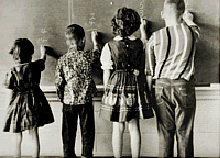« To plan or not to plan? | Main | Research position deluxe »
March 20, 2005
How to improve university education
IMPROVING LEARNING AT UNIVERSITIES: WHO IS RESPONSIBLE?

Last Fall, Wharton Marketing professor J. Scott Armstrong wrote a letter to the Wall Street Journal about the failure of business schools to teach students to do such fundamental things as give effective oral presentations, write persuasive management reports, listen to others, conduct meetings, and use statistical procedures to analyze data. This letter generated responses from "alumni, faculty, recruiters, consultants and students," spurring Armstrong to write a practical piece in the University of Pennsylvania Almanac Improving Learning at Universities: Who is Responsible?.
Armstrong argues the problem is not just based upon perception. Research has documented the failure of formal education to enable students to become more effective on the job or in other areas of their life. According to Armstrong, we have designed a system that convinces the majority of students that they are not responsible for their own learning. Possible causes of this misplaced responsibility are suggested. Armstrong concludes by proposing actions schools and universities can take.
QUOTE:
"Why is the educational system ineffective in teaching people to apply their knowledge? It is that we have designed a system that convinces most students that they are not responsible for their own learning. Surprisingly, the problem starts as soon as people are placed in groups. Zajonc’s (1965) review of social facilitation research, done on rats and students, found that when subjects observe the critical responses of others, their learning is inhibited. This led Zajonc to conclude, "students should study alone," (He did not provide advice for rats). The presence of a teacher compounds the problem (Browne et. al. 1991; Tough 1982). Grading saps responsibility and thus inhibits learning (Condry 1977; Levine and Fasnacht 1974). Student evaluations of teachers lead to a further erosion of their responsibility because the students place the responsibility on the professor (Armstrong 1998; 2004b), not to mention that the evaluation process is viewed by some as a demoralizing and demeaning exercise for faculty (Gray & Bergmann 2003)."
ABOUT THE AUTHOR

J. Scott Armstrong is Professor of Marketing at The Wharton School of the University of Pennsylvania. His research interests include forecasting methods; strategic planning; survey research; research methods, scientific communication; educational methods; social responsibility in management; persuasion through advertising. He received his PhD in Management; Marketing (with work in applied statistics, social psychology, and economics); Ford Foundation Fellowship, from the Massachusetts Institute of Technology in 1968.
Selected Recent Publications
* Principles of Forecasting: A Handbook for Researchers and Practitioners. Kluwer Academic Publishers, 2001. Contributions from 40 authors, as well as the Forecasting Dictionary.
* Long-Range Forecasting: From Crystal Ball to Computer New York: Wiley Interscience, 1978; 7 printings of 1st Edition; 2nd Edition published 1985 (700 pages). The most frequently cited book on forecasting methods.
Posted by DSN at March 20, 2005 07:06 PM